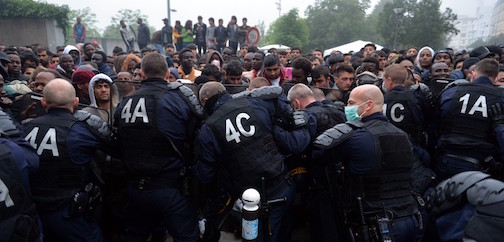In the past week, the Czech Republic elected an anti-establishment billionaire, Andrej Babis, as prime minister. The New York Times called that step a “new threat” to European unity. Accurate, in a way, because there have been several other recent steps in the same direction. The irony in this way of viewing things, however, is that the Times and many of its readers think of the European Union as a kind of Holy European Empire. Europeans and others who see the EU bureaucracy – whatever good the EU may have otherwise done – as arrogant and lacking in “democratic transparency” are viewed as dangerous renegades and “authoritarian.” (Babis’ party ANO, by the way, is an acronym meaning “Action of Dissatisfied Citizens”).
Meanwhile, a day later, in nearby Austria, Sebastian Kurz, a 31-year-old, Minister of Foreign Affairs and Integration (and a practicing Catholic), became prime minister in what the Times called a further “rightward lurch” within “Europe’s new normal.” So strong is the rejection of the open borders and pro-Muslim policies of Europe that voters gave this relatively inexperienced young man (an otherwise strong supporter of the European Union) and other Austrian rightist parties nearly 60 percent of the vote.
Something is stirring in the Old West.
We’re seeing a budding, if still disorganized, reaction in the developed world to the ways that what might be called “authoritarian liberalism” has come to dominate us. Trumpism, of course, is the most obvious example. But even in Europe, the place that seems to have gone the furthest down that illiberal path, something remarkable is underway.
Brexit, the UK’s withdrawal from the European Union, is the least surprising part of it. The Brits have only been half-hearted EU members and never entered the monetary union. There’s something in the pragmatic Anglo-American mind that doesn’t sit easy with the kind of irresponsible bureaucracy in Brussels. Lax immigration policies while London has been repeatedly hit by terrorist attacks were the last straw. In a way, Brexit is unfortunate because, as an Italian friend said to me recently, “Without the British we Europeans are mostly just ex-Fascists, ex-Nazis, ex-Communists.”
In France, mother of dirigiste government, with a people used to being managed from Paris, the Front National – once thought too far-right and tainted by earlier anti-Semitism – received one-third of the popular vote in an odd election earlier this year. Emmanuel Macron, the current president, was not so much a popular choice as a tolerable alternative. The Front National has heavy historical baggage, and may or may not succeed in the future, but a large segment of the French – much larger than the actual pro-FN vote – is seeking for something that will turn back France’s own terrorist threats and, perhaps more importantly, will secure French identity.
Much of the resistance in several European countries stems both a potent mix of grievances against the EU and opposition to mass Muslim immigration (and fear of terrorism). But the deeper cause may just be the perceived slipping away of a common European way of life and a loss of national traditions. German Chancellor Angela Merkel and Pope Francis have pushed very hard for opening borders, promoting assimilation, calming fears. The mainstream European media, like the American MSM, have largely tried to help with that task.

The result has not been a turn towards greater openness, but growing resistance: the “alt-right” Alternative für Deutschland surprisingly just took over 10 percent of the votes in a Germany still sensitive about its Nazi past; policing of borders has been beefed up within the EU; and several countries have even built fences, especially in central and Eastern Europe, where the perceived threat and, therefore, resistance is greatest.
The usual view from Brussels is that the new movements of nationalism/patriotism now in Britain, France, Germany, Holland, Hungary, Poland, Slovakia, the Czech Republic, and some of the Balkan nations is retrograde and undemocratic. By contrast, many in those countries feel it’s Brussels that operates with a high hand against the interests and wishes of various European peoples.
There’s plenty of room to criticize the new resistance movements for clumsy and poorly thought out legislation, ineptness in action, corruption, populist demagoguery – the usual political maladies. What can’t be denied, however, is that large parts of the public in North America and Europe sense a threat to their culture, political systems, and religious beliefs emanating from what are supposed to be the enlightened sectors of society.
There are valid reasons to worry about the new resistance movements. A proper fear of the way that Europe has recklessly allowed in over a million hard-to-assimilate immigrants – many young Muslim men – can turn into a kind of xenophobia. Our religious and secular leaders are right to warn about that.
But we cannot allow the proper Christian notion of welcoming the stranger to blind us to other truths, most prominently the threats certain strangers may present. This is a hard saying for nations with a Christian and republican history. But it’s simply true that if, say, a million Brazilians showed up suddenly on Europe’s doorstep, it would present problems, but not the kind of fears we’re now seeing from Scandinavia to the Mediterranean, the British Isles to borders with Turkey.
It was probably inevitable that something like this would happen, given the state of Western culture. Quite apart from the turmoil in the Middle East that has driven terrorism and refugees, we have thought of ourselves lately as a non-culture, as societies whose only role is to be open to the Other. Eager to value all cultures – except our own.
But nature, wise men know, abhors a vacuum. And if we don’t stand up for what we are and have been, we may rightly wonder whether we will continue to stand at all. Better if we can learn to do that in an intelligent and sober way – right now – than to put off decisions until only the most radical interventions will work.














